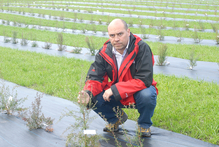Aug 25, 2013
The place with fake honey and bad milk

Britain’s Food Standards Agency has issued a nationwide warning about misleading and illegal claims made on the labels of manuka honey jars, in a worrying blow to the fast-growing Kiwi industry.
New Zealand manuka honey commands prices 10 to 20 times higher than other types of honey because of its unique and much-vaunted anti-bacterial properties.
It is estimated to earn this country up to $120 million a year in export dollars, and is praised by the likes of Welsh opera diva Katherine Jenkins and US pop singer Britney Spears. World tennis No 1 Novak Djokovic says he eats spoonfuls on the sideline between sets.
UK retailers have been putting security tags on jars of manuka honey to stop sticky-fingered shoplifters taking jars which can retail at up to £35 ($70) per 250g.
But tests by reputable UK, Chinese and Singaporean laboratories reveal many manuka honey products have none of the claimed active properties – some of the honey is not even manuka – prompting industry leaders to demand a crackdown on “potentially huge fraud”.
The UK warning about manuka honey follows the Fonterra botulism scare affecting milk product exports around the globe, and China’s conviction of a Zespri employee and subsidiary for double invoicing on kiwifruit shipments.
Some of the companies selling mislabelled honey are New Zealand producers and some are foreign. But even the most reputable New Zealand honey producers now face heightened surveillance in the UK.
A spokesman for Minister for Primary Industries Nathan Guy said yesterday that it would be disappointing if New Zealand products were not meeting the required standards.
“It’s important for industry to work with MPI and come up with some agreed and reliable standards for consumers.”
Comvita, New Zealand’s biggest manuka honey producer with a market capitalisation of nearly $150 million, is demanding the industry be cleared of cowboys.
Chief operating officer Scott Coulter said pots of manuka honey labelled with meaningless numbers and certifications were designed to confuse customers who thought they were getting UMF (Unique Manuka Factor) accredited food and nutriceuticals with measurable health benefits. “You can put a number on any honey, and that is damaging to Comvita,” Coulter told the Herald on Sunday. “They can buy a 20+ honey thinking it is manuka and it is not. People will use it and not get any benefits and that damages the reputation of the product and the industry.”
John Rawcliffe, head of the Unique Manuka Factor Honey Association, which represents 38 licensed manuka honey companies, acknowledged the UK crackdown was due.
“There is potentially huge fraud. There are higher and ever-increasing volumes of honey labelled as manuka which are not manuka,” he said.
In October 2011, Britain’s Food and Environment Research Agency (FERA) tested a small sample of five brands of manuka honey from shop shelves. Only one, made by Comvita, was up to standard. The other four (from Nelson Honey, Honeyco Rainforest, Littleover Apiaries and Native New Zealand Manuka Honey) showed no detectable “non-peroxide activity”, the anti-bacterial properties special to manuka honey.
Yesterday afternoon, Nelson Honey managing director Philip Cropp said he was a small player, producing only 150 tonnes a year. His honey had passed tests in New Zealand labs, but had sometimes failed overseas lab tests. He said he would stop advertising activity rating numbers on his labels.
The UMF Honey Association commissioned further tests in Britain, China and Singapore over the past 18 months. The accredited producers almost all passed. But of the 73 samples of honey sold by other companies, 41 failed to show the non-peroxide activity claimed for manuka honey. Separate tests in Hong Kong found 14 of 55 manuka honeys sampled were adulterated with syrup.
On the strength of the FERA tests, the Food Standards Agency alerted UK local authorities in July of possible issues with manuka honey being mislabelled and encouraged them to “step up surveillance”.
In New Zealand, beekeepers are not waiting for authorities to clean up the industry.
Whakatane businessman Jeremy Gardiner has planted 1500 manuka trees, hoping a plantation will ensure the only pollen the bees pick up is manuka. Beehives will be placed among the small saplings over a hectare on a block of Maori land. “It’s a test bed at the moment but we have 37 strains of manuka in there so we want to figure out what strains are the highest UMF value,” Gardiner said.
Near Cambridge, Moira Haddrell and her husband use a helicopter to drop hives into remote manuka bush; as soon as the flowers start to fall the hives are whipped away and the honey extracted.
“Putting it bluntly, there are some deceptive and misleading labels out there,” she said. ” I consider it very damaging to the industry.”
The UMF Honey Association hopes to develop and distribute hand-held near-infrared scanners to detect manuka honey imposters.
“If we get the science correct, the industry can grow and blossom,” Rawcliffe said. “If we don’t get it right, we get found out, we get exposed.”
Read also:
• Health benefits claimed
• A message from UK: Stop exporting ‘crap’
• Editorial: Sticky fingers in honey pot
.
